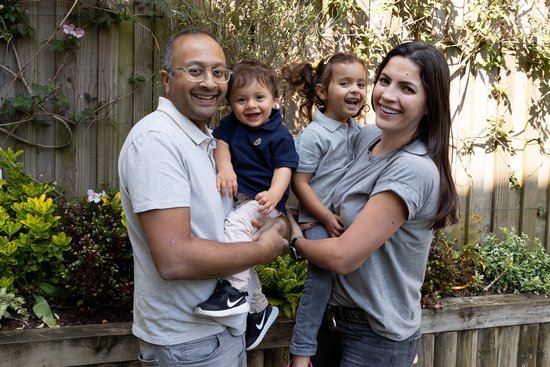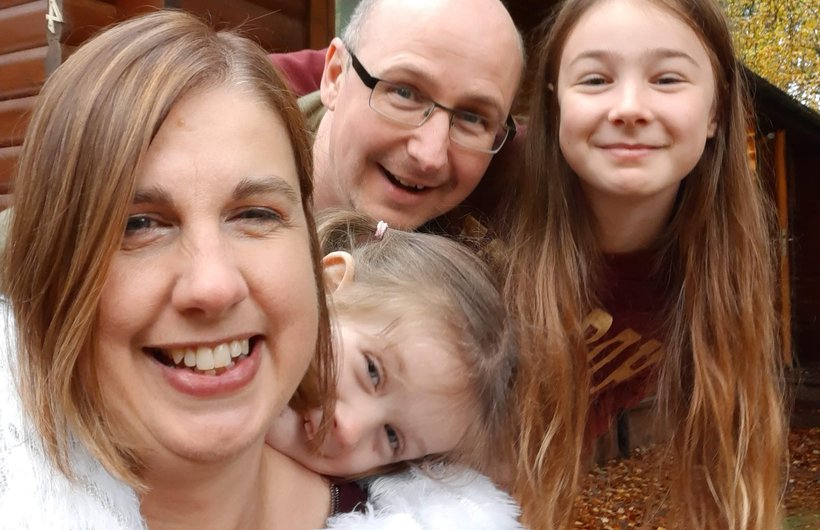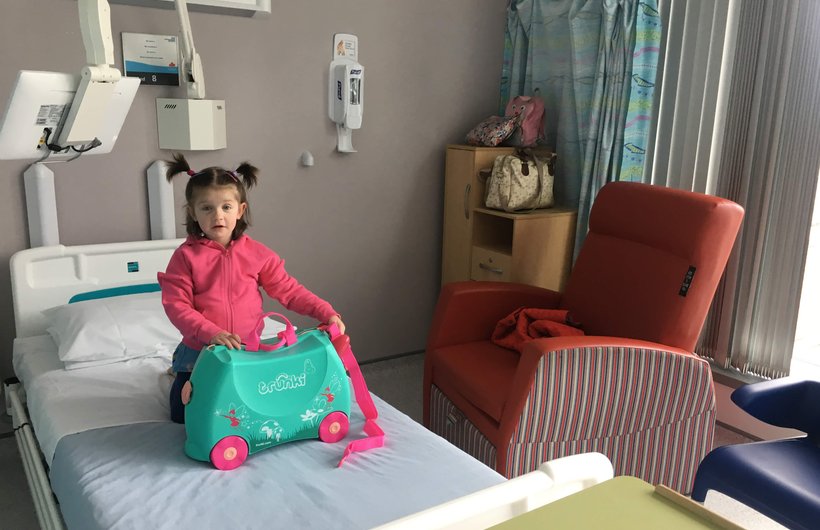Deciding against maintenance treatment
The Thomas family
Phoebe was diagnosed with neuroblastoma when she was nine months old. Whilst her disease was initially classed as 4s and shrunk with chemotherapy, it began to grow again and had spread to other parts of her body. Phoebe was then treated as high-risk but the disease progressed twice more during treatment. The family sought compassionate use of a trial drug that, at that point, had only been trialled in adults. This was approved and stopped further disease progression. Phoebe was then able to receive immunotherapy and complete frontline treatment.
After almost four years of treatment, her scans showed, and continue to show, that she has no evidence of active disease. Phoebe is now eight and is funny, inspiring, cheeky and determined.
Phoebe’s mum, Naomi, describes what it was like during the three and a half years of treatment, how Solving Kids’ Cancer UK supported the family and why they did not undergo maintenance therapy:
“We were devastated when we found out Phoebe had cancer. Full of disbelief. Shock. Our whole world was turned upside down. But we had to quickly pull ourselves together and pretty much go into autopilot. Our little girls needed us more than ever and we were going to do everything in our power to keep our little family together."
Relapses and refractory disease
"We contacted Solving Kids’ Cancer UK when Phoebe was about 18 months into treatment and already had two relapses and had refractory disease. She was on a clinical trial and we were travelling to Birmingham for this. The trial had stabilised her disease sufficiently for her to move on to surgery. Initially, support from the charity helped to set up her fundraising page and they provided emotional support as we went into a long period of in-patient stay due to complications following surgery and high dose chemotherapy."
"Unfortunately, Phoebe relapsed again after this and we were faced with very limited options for treatment. At this point we were able to speak with Nick and Donna at the charity about options. It was amazing to have this knowledge and expertise at our fingertips away from our medical team. It gave us reassurance that we were leaving no stone unturned, that we were considering all of the options available to us to give Phoebe the best chance.
"We also attended two in-person conferences hosted by Solving Kids’ Cancer UK which were amazing experiences; from being able to meet other families to hearing from experts from around the world. Again, this reassured us in our treatment decisions, giving us hope for the future and provided a unique opportunity for peer-to-peer support."
Sense of guilt
"Phoebe was in treatment from January 2016 to October 2019; almost four years and most of her life. We were very scared to stop treatment. She had had one clear MiBG scan (showing no active disease) but still had remnants of neuroblastoma showing on MRI scans. Treatment and our medical team had been our safety net and so stepping outside of that was terrifying. We had stopped treatment once before for three months and it had relapsed, so we never really felt like we had stopped until we got further than the three-month mark and more time began to elapse."
"We were, of course, happy that we were at this point and hugely grateful, but also felt a sense of guilt that we were the lucky ones. We’d seen so many children who didn't reach that far. We felt we ought to celebrate but felt we couldn't, like it was tempting fate."
"Nothing was ever going to be like how it was before cancer – we were changed forever. But Phoebe taught us to live in the present, make the most of the little things, and that being together is more important than anything else. This hasn't left us and we try to live like this every day."
A chance to live again
"In terms of maintenance therapies, we did consider both the vaccine and DFMO but we were not convinced enough by the statistics that were available at that time to feel compelled to undergo the further disruption it would cause to our family and the burden of fundraising. Phoebe had already relapsed or progressed three times so we were well aware of that reality, and we felt that the extra treatment did not give us enough assurance or hope that it would prevent relapse occurring again.
"We decided that any money we had raised would be better used in the event of a future relapse and hopefully never for us. Phoebe had just started school (something we had only dared dream of for many years) and we needed to give our family a chance to live again. We may have considered maintenance therapies if the upheaval and fundraising burden were less.
"It was difficult making this decision knowing that funds had been raised for us and that many other families were making the opposite decision but, when we were considering it all, we never came to a point where it felt like it would be the right thing to do for our family.”
10 families, 1 cancer
For Childhood Cancer Awareness Month, meet 10 different families with 10 different experiences of neuroblastoma.
 Discover more stories
Discover more stories






